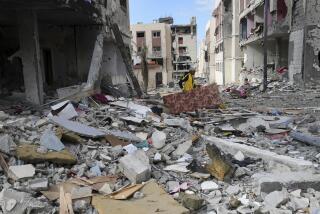U.S. Tape of Clash Prompts Libya to Cry: ‘Fake!’
- Share via
UNITED NATIONS — Libya charged Friday that the United States fabricated videotaped evidence of the final moments of an aerial encounter over the Mediterranean to falsely indicate that two Libyan jets shot down by Navy warplanes were heavily armed and had hostile intent.
“These pictures, these tapes, they are fake, fake, fake!” declared Ali Muntasser, Libya’s deputy representative to the United Nations.
The videotapes, taken by a camera in one of the U.S. aircraft, were products of “the world of Hollywood. They were very well edited, thanks to the producers, the directors and the actors,” he said during a break in a U.N. Security Council debate on the incident.
Moments before, Vernon A. Walters, the U.S. ambassador to the United Nations, had displayed two large, grainy photos that he said showed a missile on one of the Libyan jets.
That, along with tapes of the U.S. crewmen’s cockpit talk, proved that the two Libyan aircraft were on more than a reconnaissance mission, as Libya has contended, and clearly challenged the U.S. planes, Walters asserted.
“Do you think this is a bouquet of roses hanging under the wing?” he remarked to reporters, referring to a blurred image in one of the photos.
Walters sternly countered a fusillade of criticism from Third World and East Bloc nations at the Security Council session requested by Libya to debate the clash. Libya hopes to win approval of a resolution officially condemning the U.S. downing of the planes as an act of unprovoked aggression.
A rough draft of a resolution circulating at the United Nations reflected the general hostility toward the United States among nonaligned nations. However, it is clear that any such measure would be vetoed immediately by the United States, which as a permanent council member has such veto power.
There were indications that the United States was gaining the backing of key allies on the issue. Britain, the only nation to publicly back the U.S. action so far, said that it would speak on the floor during the final day of debate Monday. The Canadian delegation disclosed that it had told the United States that it accepted the Pentagon’s evidence on the encounter.
However, the tenor of Friday’s debate, dominated by the Soviet Union and Third World nations, was highly critical of the United States.
Soviet Ambassador Alexander M. Belonogov said that there was “absolutely no reason for the U.S. to resort to armed force.” The United States had not been attacked and was not entitled to open fire on another nation’s aircraft solely on the ground that Libya’s planes were near a U.S. naval force in the area, he said.
“The U.S. could not be allowed simply to attack those countries it does not happen to like,” he said.
Libya’s Muntasser called the U.S. action “premeditated” as “a prelude to large-scale aggression.” The United States actively sought to provoke Libya into a response to justify a later attack on Libya, he said.
“The presence of the air fleet and the presence of the Navy so near our shores is the biggest provocation the U.S. is making, and everybody knows that,” Muntasser added.
Of the aerial videotapes released by the Pentagon, he said angrily, “How can people take pictures from 40 miles? It’s impossible. I think people will laugh about the intelligence of (these) people.”
Representatives of several of the 17 countries who spoke in the debate echoed the charge that the U.S. action was premeditated.
Rolando Jose Sevilla Boza, a Nicaraguan representative, charged that it is no coincidence that the incident was preceded by claims that Libyan leader Col. Moammar Kadafi is building a chemical weapons plant.
Isack S.G. Mudenge, U.N. ambassador from Zimbabwe, said: “We cannot understand why Libya is singled out by those who possess poison gas not to possess the same. It is unacceptable for any country to appoint itself sheriff of the world and to arrogate to itself the right to punish those countries it does not approve of.”
The tone of the debate became so acrimonious that a British representative sharply condemned the “deplorable level of vituperation and intemperate statements.”
In defending the U.S. action, Walters himself used blunt and caustic language at times.
“The United States is not really disposed to receive lessons on terrorism from a nation like Sandinista Nicaragua, nor is it ready to be taught the norms of international behavior by nations governed by various forms of military or civilian one-party dictatorships,” he said.
“At the outset we heard it was claimed that the Libyan airplanes were unarmed. We have photographs which prove that the planes were armed.”
More to Read
Sign up for Essential California
The most important California stories and recommendations in your inbox every morning.
You may occasionally receive promotional content from the Los Angeles Times.












